The World Cup is over, what once was a hot bed of cultural vibrancy is now an expanse of shattered Brazilian self-worth. Yet, out of this dystopian wilderness there is a yellow light that continues to brighten up South America- that of the Colombian national team.
In contrast to their Portuguese-speaking rivals who are currently experiencing a severe identity crisis, Colombia’s reputation is still pulsating at such a rate that it has placed them within the premier tier of international football. A place they are well equipped to stay for a number of decades.
Before the tournament began, Los Cafeteros’ coach Jose Pekerman made the prediction that this competition would announce Colombia on the world stage and secure them a place at the ‘big boy’s table’. He appears to have been proven correct.
Possessing the second-largest population on the continent, the raw materials have always been in place for the men in yellow to make an impression on the international stage. Though, more often than not, external factors have contributed significantly to the downfall on the pitch.
Whilst their competitors have vivid memories of World Cup wins and classic matches to get nostalgic about, the tragic death of Andreas Escobar has become the defining recollection of Colombian football.
However, the country’s society is in a much healthier state nowadays. Since 2002, violence has momentously decreased, with a number of paramilitary groups demobilizing as part of a litigious peace process. This has lead to economical recovery, a boom in tourism and a mass reduction in an issue often associated with the Republic- drug production.
The development of the national team has run parallel to these positive improvements in society. Although the 2001 Copa America triumph may have proven to be a false dawn, a talented generation has emerged this decade, with a fourth place finish in the 2011 Under-17 World Cup and the 2013 South American Youth Championship already secured.
These recent triumphs help formulate the opinion that the side’s best ever World Cup finish in Brazil was not a surprise, merely a continuation of previous accomplishments with a squad more than capable prolonging this age of prosperity.
Between the sticks, future Gunner David Ospina has all the hallmarks to become a world-class keeper- most notably his quickness and demeanour. Despite his relatively young age for his position, he has been a regular for both club and country for several seasons, this speaks volumes for his ability and the trust his managers have placed in him.
At full back, Camilo Zuniga and Pablo Armero are your archetypal modern defenders, with the former coming of age for Napoli in the past few seasons. These two both possess regular Champions League experience and have the highly impressive Santiago Arias chasing down one of their first team roles, a 22 year old who can count Manchester United amongst his suitors.
The average age of the central Colombian defence has been in the mid-30s in recent seasons, with Mario Yepes and Luis Perea performing marvellously despite their advancing years. At the time of writing it is not yet known what the international future is for this pair, but in Cristian Zapata they have a ready-made replacement judging by his astute performances this summer.
However, it is the potentially magnificent young pair of Stefan Medina and Eder Alvarez Balanta who are thought of as the long-term future of the back line.
Whilst there are no standouts in the defensive midfield area, Carlos Sanchez more than proved his worth when faced against Yaya Toure in Brazil. In a fantastic display, the Elche man brushed aside possibly the most complete player in world football.
As well as him, Pekerman has a variety of options with Abel Aguilar, Edwin Valencia and Fredy Guarin all staking a claim for a place in the side. The latter in particular has the most genuine ability of the quartet but seems to lack the trust of Pekerman when it comes to vital games.
It is in the final third of the pitch where this Colombian team starts to get particular exciting though. James Rodriguez announced himself as a world-class performer at this summer’s tournament and with him still at a youthful age, the side looks set to built around the player for the next decade.
Yet, it would be a disservice to revel in the performances of James and not mention Juan Cuadrado. The freakishly quick Serie A man is a coach’s dream, with his unquestionable work-rate and ability at both ends of the pitch. Had it not been for the Monaco number 10’s showings, the Viola starlet would have gained a lot more praise and exposure.
Conversely, it seems foolish to suggest, but Colombia possess a player prospectively faster than Cuadrado in Victor Ibarbo and a left-footed trequartista with the potential to be superior to Rodriguez in Juan Quintero.
Coupled with Cuadrado, Ibarbo and the Fiorentina man are undoubtedly the fastest pair of wingers in world football and contradict everything analysts speak of with regards to the death of the winger and direct play in modern soccer. Both could claim to be within the top five fastest players in top level European soccer. Merely viewing their names on a team sheet forces the opposition manager to play a deep-defensive line, which in turn creates more space for James and his potential heir/partner Juan Quintero.
The Porto man was signed as a replacement for Rodriguez by the Portuguese side and the pair are almost identical, with James two years the senior. It’ll be interesting to see how Quintero develops before next year’s Copa America, he may get to the level of ability where Pekerman has no choice but to accommodate both in his line-up.
If his MVP performance of five goals and four assists in the 2013 South American Youth Championship victory are anything to go by, the twenty-one year old thrives in International competition.
Then there is the Colombian striking contingent. Apart from maybe Argentina, a case could be made for Los Cafeteros to have the most attacking depth in international football. The lack of comment on Falcao’s injury during the World Cup speaks volumes as to how inundated they are with strikers. No other national team can claim to possess six attackers who reached double figures in major European leagues last term.
Yet, in Adrian Ramos, Radamel Falcao, Carlos Bacca, Jackson Rodriguez, Fredy Montero and Luis Muriel Colombia has exactly that. Add regular starter Teofilo Gutierrez along with Dorlan Pabon, Hugo Rodellega and Duvan Zapata and you have a solid roster of ten proven forwards at the manager’s disposal.
It seems then, that everything is in place for The Coffeers to make a serious dent on the world stage; the formative years are over, the experience and mental belief has been acquired. Don’t be surprised if you start to see those enchanting dance moves in a major final before the decade is out.
–Paul Hill










Recent Comments